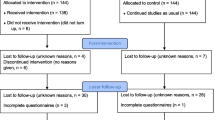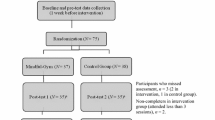Abstract
112 women and 37 men, with an average age of 50 years were referred for MBSR training with a range of chronic psychological issues. All participants completed the Warwick–Edinburgh Mental Wellbeing Scale (Tennant et al. in Health and Quality of Life Outcomes 5:63, 2007) before and after the mindfulness training programme. A significant overall effect of pre/post training was found and this difference was not related to a specific disorder. The results suggest that a ‘brief’ dose of MBSR can have a positive impact on measures of well-being in a manner that is not related to patient characteristics. A follow-up of 28 participants confirms that participation in the 5-week Living Mindfully MBSR programme significantly enhances psychological well-being immediately after training, and this benefit is maintained up to 4 years after training. Continued practice in mindfulness meditation showed an insignificant relationship to well-being scores at follow up. Qualitative data suggest that the 5 week MBSR is an effective means of developing emotion regulation and psychological well-being.

Similar content being viewed by others
References
Chiesa, A., Serretti, A., & Jakobsen, J. C. (2013). Mindfulness: Top-down or bottom-up emotion regulation strategy? Clinical Psychology Review, 33, 82–96.
Coffman, S. J., Dimidjian, S., & Baer, R. A. (2006). Mindfulness-based cognitive therapy for prevention of depressive relapse. In R. Baer (Ed.), Mindfulness based treatment approaches: Clinicians guide to evidence base and applications. Burlington: Academic press, Elsevier Inc.
Farb, N. A. S., Anderson, A. K., & Segal, Z. V. (2012). The mindful brain and emotion regulation in mood disorders. Canadian Journal of Psychiatry, 57(2), 70–77.
Fjorback, L. O., Arendt, M., Ørnbøl, E., Fink, P., & Walach, H. (2011). Mindfulness-based stress reduction and mindfulness-based cognitive therapy: A systematic review of randomized controlled trials. Acta Psychiatrica Scand., 124, 102–119.
Goldin, P. R., & Gross, J. J. (2010). Effects of mindfulness-based stress reduction (MBSR) on emotion regulation in social anxiety disorder. Emotion, 10(1), 83–91.
Kabat-Zinn, J. (1982). An outpatient program in behavioral medicine for chronic pain patients based on the practice of mindfulness meditation: Theoretical considerations and preliminary results. General Hospital Psychiatry, 4(1), 33–47.
Kabat-Zinn, J. (1990). Full catastrophe living: How to cope with stress, pain and illness using mindfulness meditation. New York: Dell Publishing.
Kabat-Zinn, J., Lipworth, L., & Burney, R. (1985). The clinical use of mindfulness meditation for the self-regulation of chronic pain. Journal of Behavioural Medicine, 8, 63–190.
Keng, S., Smoski, M. J., & Robins, C. J. (2011). Effects of mindfulness on psychological health: A review of empirical studies. Clinical Psychology Review, 31, 1041–1056.
Klainin-Yobas, P., Cho, M. A., & Creedy, D. (2012). Efficacy of mindfulness-based interventions on depressive symptoms among people with mental disorders: A meta-analysis. International Journal of Nursing Studies, 4, 109–121.
Linehan, M. M. (1987). Dialectical behaviour therapy in groups: Treating borderline personality disorders and suicidal behaviour. In C. M. Brody (Ed.), Women’s therapy groups: Paradigms of feminist treatment (pp. 145–162). New York: Springer Publishing.
Lutz, J., Herwig, U., Opialla, S., Hittmeyer, A., Janke, L., Rufer, M., et al. (2014). Mindfulness and emotion regulation: An fMRI study. Social Cognitive and Affective Neuroscience, 9(6), 776–785.
Lynn, S. J., & Condon, L. P. (2013). Review of experimental and quasi-experimental studies finds that mindfulness-based interventions are more effective than standard care for reducing depressive symptoms in adults with mental disorders. Evidence Based Nursing, 16(1), 12–13.
Roemer, L., Salters-Pedneault, K., & Orsillo, S. M. (2006). Incorporating mindfulness- and acceptance-based strategies in the treatment of generalized anxiety disorder. In R. Baer (Ed.), Mindfulness based treatment approaches: Clinicians guide to evidence base and applications. Burlington: Academic press, Elsevier Inc.
Sauer, S., Walach, H., Schmidt, S., Hinterberger, T., Lynch, S., Büssing, A., & Kohls, N. (2012). Assessment of mindfulness: Review on state of the art. Mindfulness,. doi:10.1007/s12671-012-0122-5.
Sedlmeier, P., Eberth, J., Schwarz, M., Zimmerman, D., & Haarig, F. (2012). The psychological effects of meditation: A meta-analysis. Psychological Bulletin, 138(6), 1139–1171.
Tennant, R., Hiller, L., Fishwick, R., Platt, S., Joseph, S., Weich, S., Parkinson, J., Secker, J., & Stewart-Brown, S. (2007). The Warwick–Edinburgh mental well-being scale (WEMWBS): development and UK validation. Health and Quality of Life Outcomes, 5:63. http://www.hqlo.com/content/5/1/63.
Author information
Authors and Affiliations
Corresponding author
Rights and permissions
About this article
Cite this article
Mitchell, M., Heads, G. Staying Well: A Follow Up of a 5-Week Mindfulness Based Stress Reduction Programme for a Range of Psychological Issues. Community Ment Health J 51, 897–902 (2015). https://doi.org/10.1007/s10597-014-9825-5
Received:
Accepted:
Published:
Issue Date:
DOI: https://doi.org/10.1007/s10597-014-9825-5




